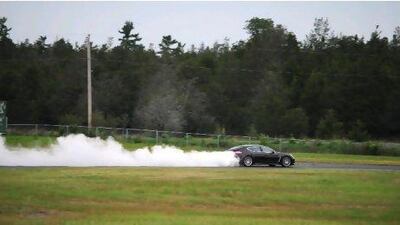It's never a good thing when everyone on pit row is running towards you screaming. It's even worse if they're carrying fire extinguishers and waving their arms about in mad gesticulations of panic. One's first thought is to wonder whose car is on fire; it's just like when that impossibly beautiful woman smiles at you from across the bar and you crane around to see who she's looking at. The brain - or perhaps it's just my brain - has a way of filtering out impending disaster as well as unexpected joy in equal measure.
Only when those cranial synapses start firing on all cylinders does it dawn on you that it might be you who is aflame. At this point, even the dull-witted will evacuate a car in a hurry. Piloting a massively overpowered car around a racetrack lined with bodywork-crunching steel guard rails has a way of focusing one's attention, but it pales to the sheer singularity of purpose you'll feel if you think the aforementioned automobile's petrol tank is about to explode. Who cares if the car is in park? Who even cares if the car is stopped? Where it might explode is not nearly as important as making sure you're not in it when it does.
Of course, as soon as I exited stage left, it was plainly obvious that something was amiss with my Porsche Panamera Turbo S. Focused as I had been on avoiding the guard rails (I had been greatly concerned about causing any damage to the hyper-expensive Porsche; yes, that's irony), I had somehow missed the great billows of smoke pouring from the Porsche's rear end. And then, just when the shock of all that oily fog subsided, the big V8's quad pipes belched a six-foot plume of flame. I'm pretty sure that wasn't in the brochure.
Said pit crew eventually extinguished the blaze, though not before the right rear plastic bumper cover got seriously singed. After a few minutes of ensuring that no further explosions were imminent, we sat down to that ages-old tradition of bench racing, wondering what the heck had just happened. The blaze may have been extinguished in mere seconds but we ruminated for hours.
What happened, we found out later, is that one of the Panamera's turbochargers (the Turbo S has two) blew a seal, pouring oil into the exhaust system. Unfortunately, the exhaust side of a turbocharger routinely reaches temperatures of 900°C. Since oil burns at 500°C, the result was our impromptu car-b-cue. Covered in the fire retardant from portable extinguishers, clad in melted bumper and dripping hot oil out its tailpipes, the Turbo S was a sorry sight and had to be trailered back to the garage.
"So what's the lesson in this, Dave?" you're asking. "Don't buy a Porsche Panamera Turbo S. Right?"
Well, not quite. In fact, quite possibly the opposite. You see, though, the wonky bearing that caused the turbocharger to go kaput (a German technical term related to rapid dispersement of lubricant), the Panamera's 4.8L V8 was completely unharmed by the conflagration. Despite losing oil for more than half of the 4.03km racetrack I was on (and, yes, I had failed to notice the smokescreen the whole time) with yours truly's foot planted firmly to the metal, the Panamera's internals suffered not a bit.
The reason was simple. Porsche designs all its engines for the worst-case scenarios of racing. One of the byproducts is that the Panamera's engine carries a whopping 9L of oil in its semi-wet sump oil pan, rather than the more common four or five. So, despite my attempt to fog every mosquito in the vicinity, the Porsche never ran out of oil and therefore was never starved of the stuff, which is the primary cause of death in internal combustion engines. Indeed, pretty much any other turbocharged motor would have lunched its engine under the same circumstances.
Instead, the Panamera will get a new turbocharger and exhaust system (it could have been flushed but because the car is brand new, it bears replacing) as well as the repainted bumper cover (even Porsche plastic is tough). It will then drive like brand new (in fact, I am going to drive it post-impeller surgery just to see if the doctors have made it as good as new) as if nothing untoward ever happened.
So the lesson is this: Pray that you never blow a turbocharger. But if you do - and turbocharger failure isn't as uncommon as you might think - hope that you're in a Porsche. Or a car that is equally over-engineered.

